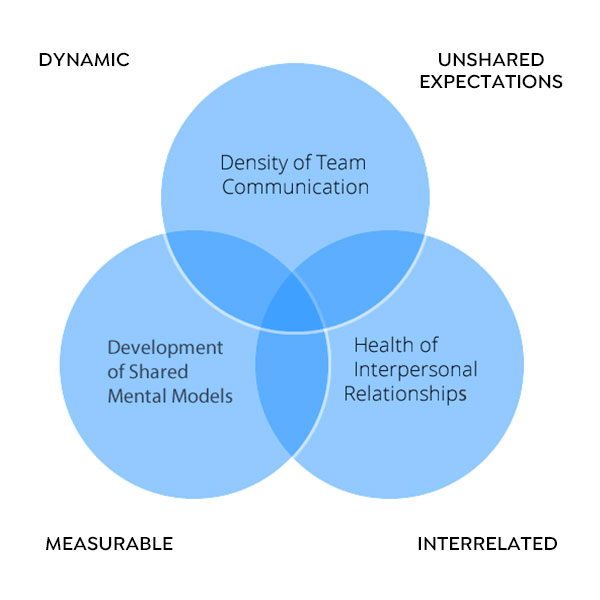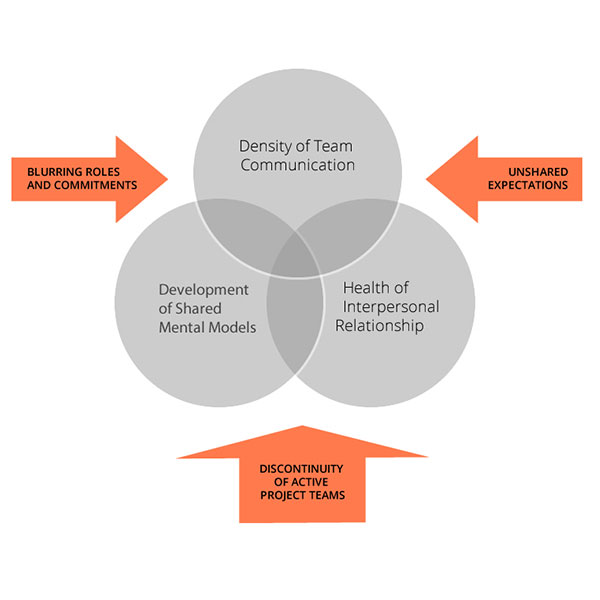
UNIVERSITY RESEARCH INSTITUTE
Professional Team Collaboration Research
Current Research Program: 2014-2025
Actionable Scientific Assessment of Team Partnering and Collaboration
Utilizing the latest measures in behavioral science and data analytics, it is now possible to identify a series of early indicators, not typically visible to traditional project management, that accurately monitor team integration and reliably predict project stress.
Project Team Collaboration
The built environment for healthcare is expensive and magnificently complicated. To create it requires the assemblage and management of large, multidisciplinary collections of experts. Sometimes these complex project teams produce the right building for the right price at the right time. Sometimes they don’t.
What is the single most powerful variable that determines project outcomes? Professional Collaboration. When professionals collaborate effectively, they improve processes, wire around problems, and, as a result, enjoy themselves. When they don’t collaborate, they usually can’t agree on where to go for lunch.
Since engendering collaboration is now seen as critical. How do we do it? We all remember management 101, where we learned that you can’t manage what you can’t measure. Therefore, the current pressing task is to learn to effectively and consistently measure professional team collaboration.
Utilizing behavioral scientists from the fields of industrial psychology, organizational behavior, and behavioral economics, we have developed the capacity, on a monthly basis, to show project managers exactly where collaboration is and is not working. We have learned to illuminate the network of human commitments, opinions, and attitudes that drive the successful performance of multidisciplinary project teams. The object is to identify team stress before it results in problems with budgets and schedules.
You cannot manage what you do not measure
Our Critical Management Challenge
Utilizing the latest empirical measures, it is possible to identify a series of early indicators, not typically visible to traditional project management, that accurately monitor team integration and reliably predict project stress.
Our Goal
We illuminate the network of human commitments, opinions, and attitudes that drive the performance of multidisciplinary project teams and become more powerful and predictive over time than traditional project metrics.
How do we do it?
Empirical Measurement
We employ leading edge empirical measurement techniques that are minimally invasive:
Web-based Questionnaire
We utilize a series of web-based questionnaires that can be answered by selected team members in no more than 20 minutes. They can respond monthly from anywhere that is convenient.
Early Alert System
How and when do you typically know when things are going to be delayed and over budget? After they are delayed and over budget.
People on the teams almost always know that problems are on the rise - this manifests in team member behavior. This is why empirical research demonstrates that conflict in a team produces changes to team member interactions.

Positive Signs of Team Collaboration

Disruptors of Team Collaboration
Monthly Assessments of Six-Dimensions of Team Integration
- Multiple indicators across several dimensions indicate a specific area of concern.
- Area of concern has remained salient over several reporting periods.
- Our analysis suggests an actionable cause or causes.
- Developing area of concern is reflected in only a limited number of indicators.
- Area of concern is not yet shown persistent over time.
- Our analysis does not suggest an actionable cause or causes.
- There are dimensions for which our indictors suggest increasing team integration.